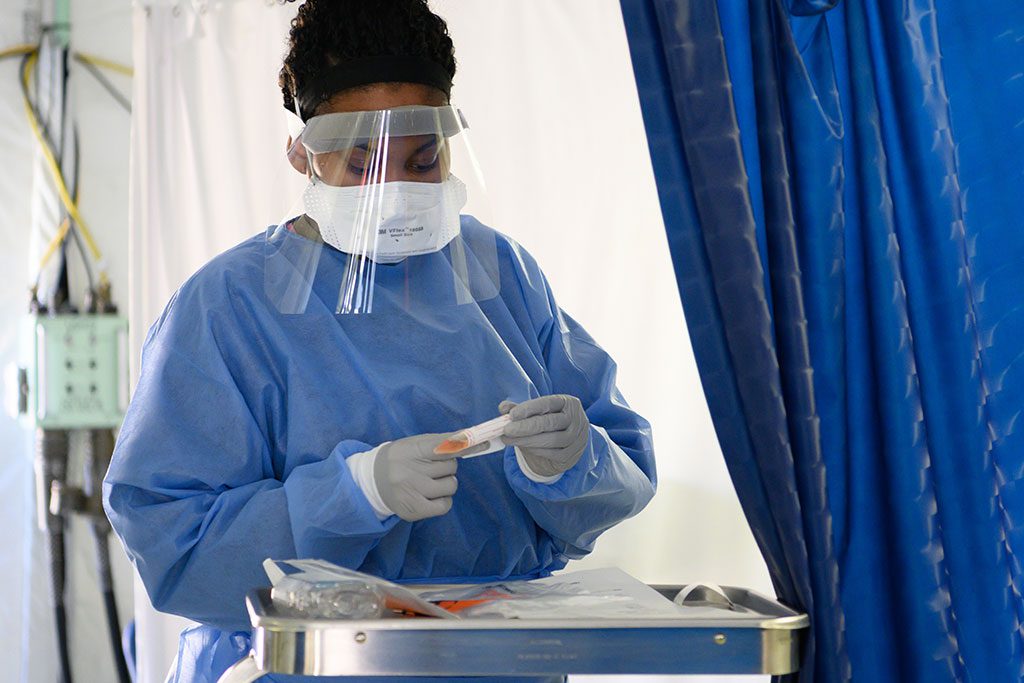Bedside AI tool allows acute care centers to more quickly identify and isolate infected patients
A new University of Oxford-led study has shown rapid screening for COVID-19 aided by Artificial Intelligence (AI) correctly ruled out infection 99.7 percent of the time and was faster than current diagnostic testing methods for rapid triage in emergency settings.
Results of the CURIAL-Rapide evaluation study show Covid-19 screening results were available 45 minutes after patients arrived in the emergency department – 16 minutes, or 26 percent, faster than lateral flow tests (LFTs) – during a three-month evaluation at the John Radcliffe hospital.
When compared against results of PCR testing, CURIAL-Rapide was more likely to identify Covid-19 patients than the LFTs and corrected ruled out the infection 99.7 percent of the time.
Collaborating with University Hospitals Birmingham NHS Foundation Trust, Portsmouth University Hospitals NHS Trust, and Bedfordshire Hospitals NHS Foundation trust, the study found that the AI test performed consistently across 72,000 admissions to 5 UK hospitals, providing high-confidence negative results for uninfected patients up to 98.8% of the time. The study also found that CURIAL-Rapide was 21 percent more effective at identifying Covid-19 patients than LFTs between December 2020 and March 2021.
Lead researcher and NIHR Academic Clinical Fellow at the John Radcliffe Hospital Dr Andrew Soltan said, “Many of our patients coming to the ED are in the most vulnerable groups. CURIAL-Rapide is exciting because it uses new near-patient testing to collect all the data needed for a prediction by the bedside in 10 minutes, cutting out the time for transporting samples to a lab. This means infected patients are identified sooner, while patients being admitted with other conditions can be quickly and safely transferred to wards where they are less likely to be exposed.”
The technology could be particularly beneficial for smaller hospitals and clinicals which lack and on-site lab or if testing resources are stretched during surges.
The CURIAL-Rapide AI screening test, developed from the technology used in the CURIAL-1.0 model released last year, uses routine tests to screen emergency department patients for COVID-19. The new version of CURIAL uses only tests that can be performed at the bedside, achieving a 10-minute processing time without needing access to a laboratory.
During a three month evaluation period at the John Radcliffe Hospital, CURIAL-Rapide results were available 6:52h sooner than PCR results, and correctly ruled-out COVID-19 for 58.5% of negative patients who were triaged by a clinician to ‘COVID-19-suspected’ (amber) areas.
In addition, in a retrospective evaluation of lateral flow testing for all patients admitted to OUH between 23 December 2020 and 6 March 2021, LFTs were 56.9 percent effective at identifying patients who had Covid-19, but this improved to 88.2 percent when used in combination with CURIAL-Rapide.
A different AI model named CURIAL-Lab, which uses routine blood tests performed in a laboratory alongside vital signs, was at least as effective as CURIAL-Rapide when tested at collaborating hospitals. As all the data required for CURIAL-Lab is collected within 1h as part of standard-care, this test can be deployed rapidly at-scale rapidly without additional costs.
“CURIAL has proven to be a very effective tool for both rapid front door diagnosis of COVID-19 and to ease the patient flow through the hospital. This ultimately results in fewer hospital acquired infections and opens up an exciting prospect for future AI tools to help overburdened emergency departments,” noted Dr. Ravi Pattanshetty, Emergency medicine consultant at OUH.
The research team are in the process of applying for funding from the NHSx AI Health and Social Care Award to drive a national rollout as well as widescale decision-support trials.



